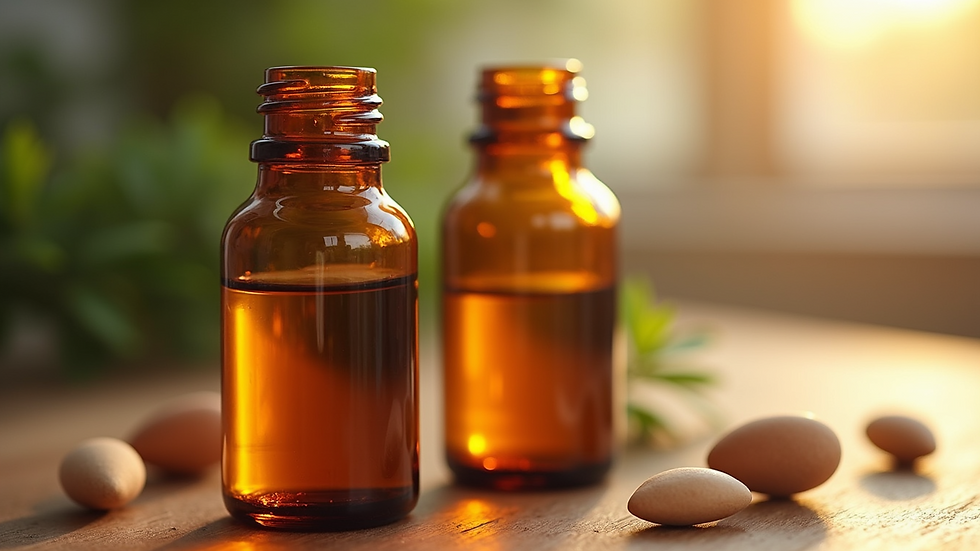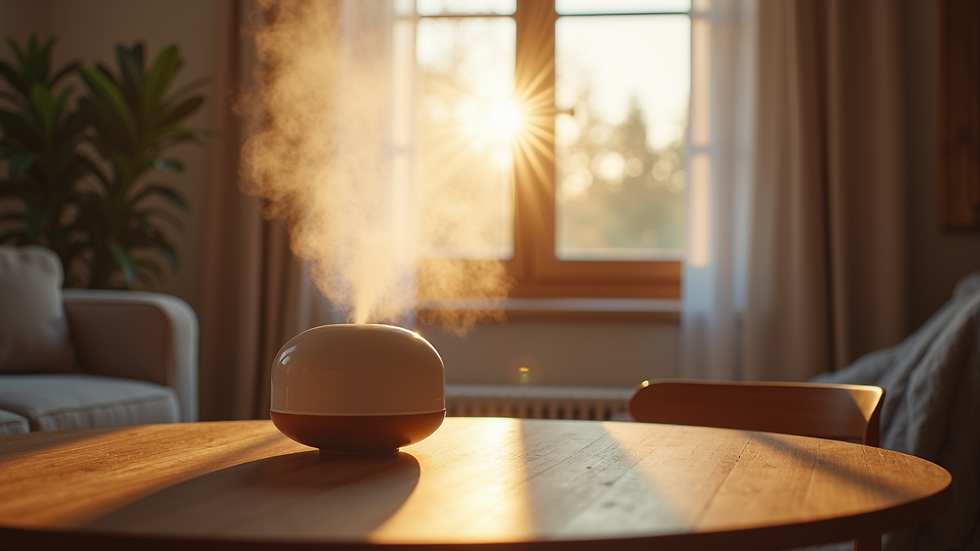Enhance Your Wellness with Essential Oils
- darryl

- Aug 18, 2025
- 4 min read
Updated: Aug 25, 2025
In recent years, natural oils have gained significant popularity for their ability to promote wellness in a gentle and holistic way. These oils, derived from plants, flowers, and herbs, offer a variety of benefits that can enhance your physical and emotional health. Whether you want to improve your skin, boost your mood, or create a calming environment, natural oils provide versatile solutions that fit seamlessly into your daily routine.
Discovering the Uses of Natural Oils for Health and Beauty
Natural oils have been used for centuries across different cultures for their healing and beautifying properties. Today, they continue to be a staple in wellness practices due to their purity and effectiveness. Some of the most common uses include:
Skin Care: Oils like jojoba, argan, and rosehip are rich in vitamins and antioxidants. They help moisturize dry skin, reduce inflammation, and promote a youthful glow.
Hair Care: Coconut and castor oils nourish the scalp, strengthen hair strands, and reduce dandruff.
Aromatherapy: Oils such as lavender and eucalyptus are used in diffusers to relieve stress, improve sleep, and clear nasal passages.
Massage Therapy: Natural oils provide a smooth glide for massage while delivering therapeutic benefits like muscle relaxation and pain relief.
Incorporating these oils into your daily routine can be as simple as adding a few drops to your moisturizer, using them as a hair mask, or diffusing them in your living space.

How to Choose and Use Natural Oils Safely
Choosing the right natural oil depends on your specific needs and skin type. Here are some tips to help you select and use oils safely:
Identify Your Purpose: Are you looking for hydration, relaxation, or healing? Different oils serve different purposes.
Check Purity: Always opt for 100% pure, cold-pressed oils without additives or synthetic fragrances.
Patch Test: Before applying any oil to your skin, do a patch test to avoid allergic reactions.
Dilution: Some oils are potent and should be diluted with a carrier oil like almond or coconut oil before use.
Storage: Keep oils in dark glass bottles away from heat and sunlight to preserve their potency.
By following these guidelines, you can maximize the benefits of natural oils while minimizing any risks.

What is the 30 50 20 rule for essential oils?
The 30 50 20 rule is a simple guideline for blending oils to create balanced and effective mixtures. It helps ensure that your blend has the right proportions of top, middle, and base notes, which affect the aroma and therapeutic properties.
30% Top Notes: These are the lightest and most volatile oils that evaporate quickly. Examples include lemon, peppermint, and eucalyptus. They provide an initial burst of fragrance and energize the senses.
50% Middle Notes: Also called heart notes, these oils last longer and form the core of the blend. Lavender, rosemary, and geranium are common middle notes. They offer calming and balancing effects.
20% Base Notes: These are the heaviest oils that linger the longest. Examples include sandalwood, patchouli, and cedarwood. Base notes ground the blend and provide depth and longevity.
Using this rule, you can create your own personalized blends that are both aromatic and therapeutic. For instance, a relaxing blend might combine 30% lavender (top), 50% chamomile (middle), and 20% sandalwood (base).
Practical Ways to Incorporate Natural Oils into Your Daily Life
Integrating natural oils into your routine can be enjoyable and straightforward. Here are some practical ideas:
Morning Boost: Add a few drops of citrus oil like orange or grapefruit to your diffuser to start your day with energy.
Skincare Ritual: Mix a drop of rosehip oil into your moisturizer for added hydration and skin repair.
Relaxing Bath: Add 5-10 drops of lavender or chamomile oil to your bathwater to unwind after a long day.
DIY Cleaning: Use lemon or tea tree oil mixed with water and vinegar as a natural household cleaner.
Sleep Aid: Dab a small amount of diluted lavender oil on your pillow to promote restful sleep.
These simple steps can help you experience the benefits of natural oils without complicating your schedule.

Exploring the Benefits of Essential Oils for Mind and Body
Among the many natural oils available, essential oils stand out for their concentrated therapeutic properties. Extracted from various parts of plants, these oils are used in aromatherapy and topical applications to support mental clarity, emotional balance, and physical health.
Some notable benefits include:
Stress Reduction: Oils like lavender and bergamot help lower cortisol levels and promote relaxation.
Improved Focus: Peppermint and rosemary oils can enhance concentration and mental alertness.
Pain Relief: Eucalyptus and ginger oils have anti-inflammatory properties that ease muscle and joint discomfort.
Immune Support: Tea tree and oregano oils possess antimicrobial qualities that help fight infections.
When using essential oils, it is important to follow safety guidelines such as proper dilution and avoiding ingestion unless under professional supervision.
Embrace Wellness Naturally with Oils
Natural oils offer a gentle yet powerful way to enhance your wellness. By understanding their uses, selecting the right oils, and applying them safely, you can create a personalized wellness routine that nurtures your body and mind. Whether you seek beauty benefits, emotional balance, or physical relief, these oils provide versatile options to support your health naturally.
Start exploring the world of natural oils today and discover how they can transform your daily wellness practices.




Comments